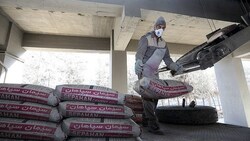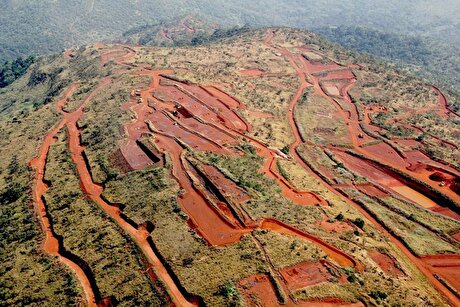
Iran imposes 18% tariff on exports of raw steel, cement

Iran’s ministry of trade (MIMT) has imposed a tariff of 18% on exports of raw steel, cement and some key metals to prevent supply shortages and price rises that could cause problems for local industries.
Deputy trade minister Alireza Peymanpak said on Saturday that Iran’s Market Regulation Headquarters (MRH) had decided to impose the duties following a surge in overseas shipments over the winter that had been caused by a series of international developments, including the war in Ukraine.
“Given the crisis in Ukraine and the surge in oil prices since January, we witnessed a jump of prices of export commodities … thus the MRH imposed the 18% duty on export of commodities to maintain the domestic market balance and to avoid a potential shortage,” Peymanpak was quoted as saying by the IRIB News.
The official said that the tariffs have been applied mainly to exports of raw steel, cement and some key metals.
He said the tariff may increase to comply with price hikes in the international commodities market although he insisted that some tariffs may be reduced or removed to enable Iranian traders to swap commodities with foreigners.
Iran has reported successive periods of growth in exports of metals and mining products since 2019 when the country decided to provide more support to the sector to compensate for losses suffered in crude exports because of American sanctions.
Overseas shipments have increased both in value and volume terms since February when supplies from two main metals exporters Russia and Ukraine started to decline because of a military conflict between the two neighboring countries.
A November 2021 data released by the World Steel Association suggested that Iran’s steel output had declined, yet the country’s world standing remains unchanged as the 10th biggest steel producer.
Iranian steel mills produced a total of 22.4 million tons of crude steel in the first 10 months of 2021, which indicate a 5.7% decline compared with the corresponding period of 2020.
Source: ICCIMA


Gold price edges up as market awaits Fed minutes, Powell speech

Glencore trader who led ill-fated battery recycling push to exit

Emirates Global Aluminium unit to exit Guinea after mine seized

UBS lifts 2026 gold forecasts on US macro risks

Iron ore price dips on China blast furnace cuts, US trade restrictions

Roshel, Swebor partner to produce ballistic-grade steel in Canada

EverMetal launches US-based critical metals recycling platform

US hikes steel, aluminum tariffs on imported wind turbines, cranes, railcars

Afghanistan says China seeks its participation in Belt and Road Initiative

First Quantum drops plan to sell stakes in Zambia copper mines

Ivanhoe advances Kamoa dewatering plan, plans forecasts

Texas factory gives Chinese copper firm an edge in tariff war

Pan American locks in $2.1B takeover of MAG Silver

Iron ore prices hit one-week high after fatal incident halts Rio Tinto’s Simandou project

US adds copper, potash, silicon in critical minerals list shake-up

Barrick’s Reko Diq in line for $410M ADB backing

Gold price gains 1% as Powell gives dovish signal

Electra converts debt, launches $30M raise to jumpstart stalled cobalt refinery

Gold boom drives rising costs for Aussie producers

First Quantum drops plan to sell stakes in Zambia copper mines

Ivanhoe advances Kamoa dewatering plan, plans forecasts

Texas factory gives Chinese copper firm an edge in tariff war

Pan American locks in $2.1B takeover of MAG Silver

Iron ore prices hit one-week high after fatal incident halts Rio Tinto’s Simandou project

US adds copper, potash, silicon in critical minerals list shake-up

Barrick’s Reko Diq in line for $410M ADB backing

Gold price gains 1% as Powell gives dovish signal

Electra converts debt, launches $30M raise to jumpstart stalled cobalt refinery
















